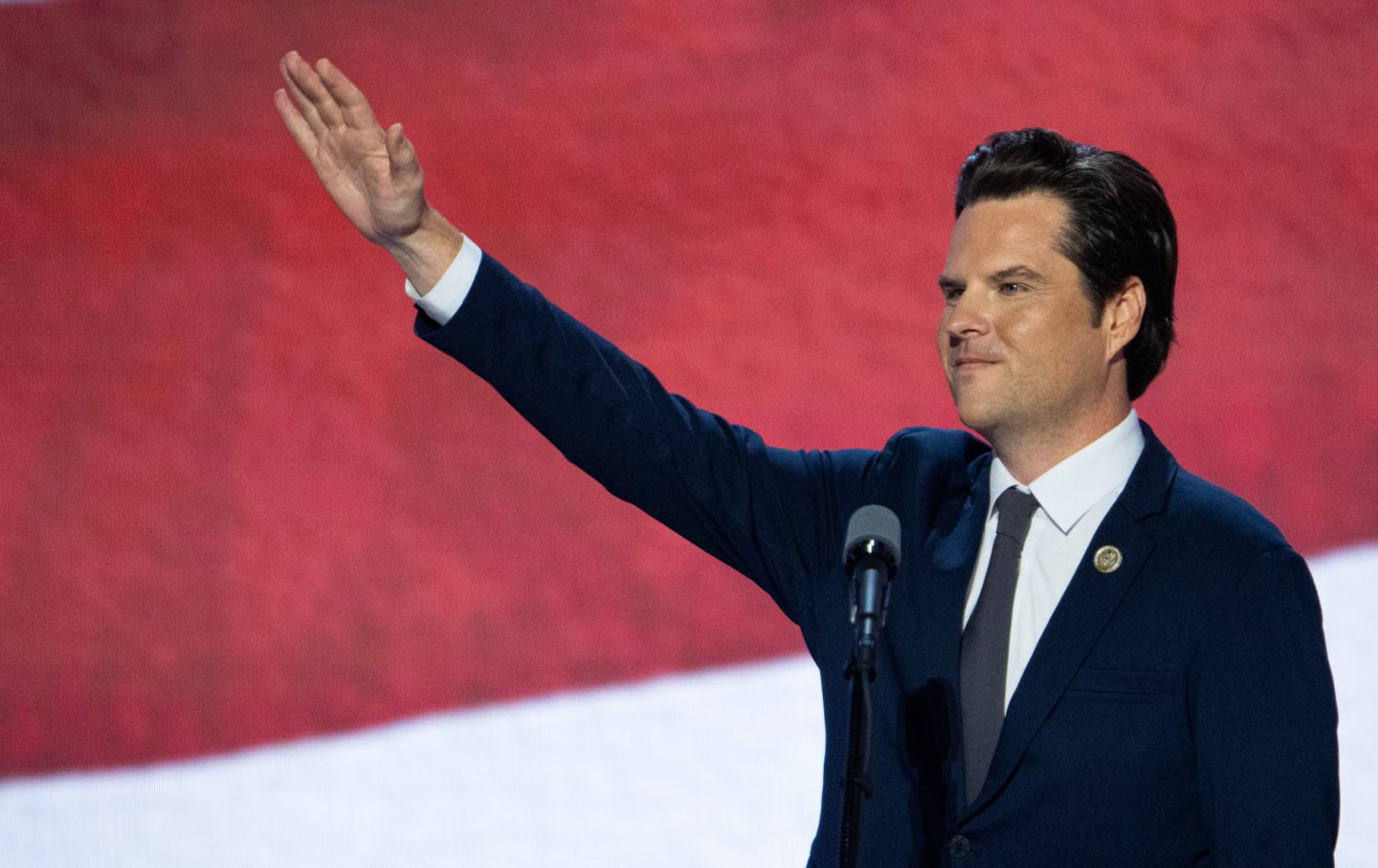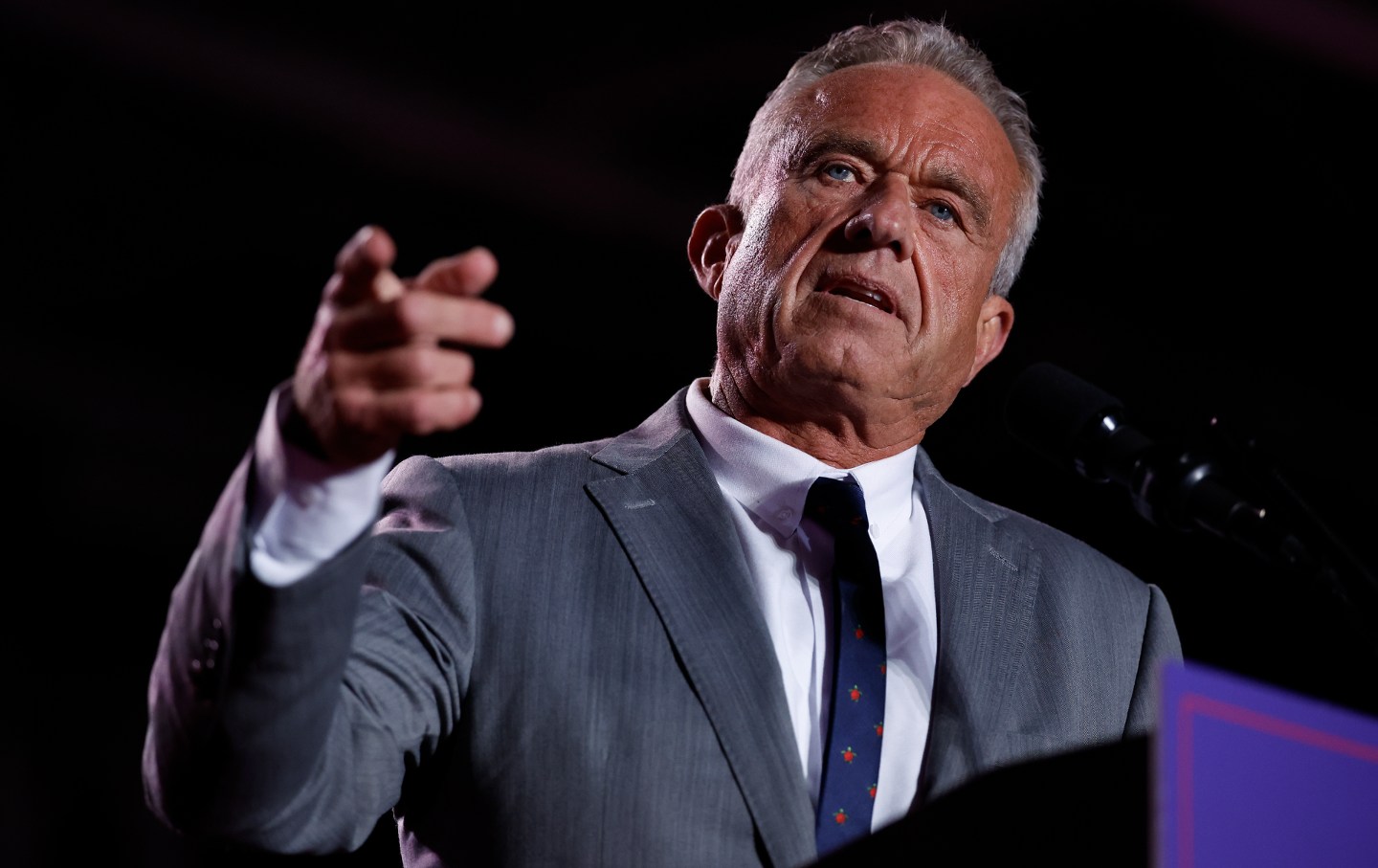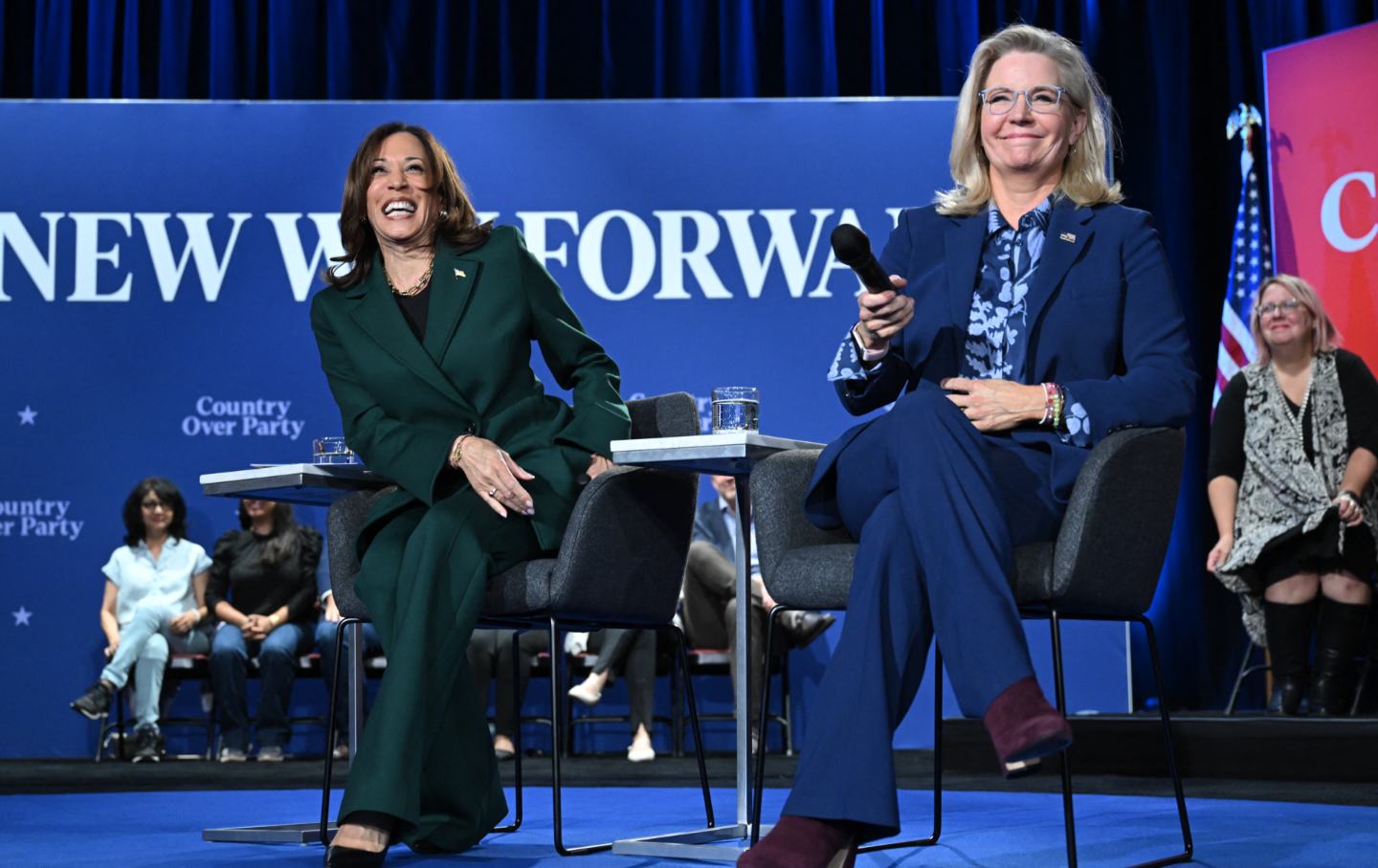Mike Johnson’s Art of the Deal
Kevin McCarthy drew the ire of his Republican colleagues when he brokered a spending agreement last year. His successor has now done the same.

Speaker of the House Mike Johnson (R-La.) leaves a caucus meeting in December 2023 in Washington, D.C.
(Drew Angerer / Getty Images)Stop me if you’ve heard this one: A Republican speaker of the House has reached a deal to forestall a fast-looming deadline to keep the basic operations of government intact, even as hard right members of his conference threaten to capsize it. Yes, lawmakers have returned to Washington to launch the second session of the 118th Congress, and have fallen into the exact same procedural battle lines that made the first session a historic legislative failure.
Toward the end of that yearlong lawmaking face-plant, newly installed GOP Speaker Mike Johnson brokered a deal to head off the last rapidly approaching deadline for a government shutdown by nudging it a bit forward on the calendar and splitting it in two. One set of government operations would grind to a halt in the absence of a spending accord on January 19, while the remainder would terminate on February 2. At the time, Johnson’s can-kicking gambit was hailed (mostly by Johnson and his allies) as a savvy breakthrough in the precincts of punitive budget-obstruction on the right. Johnson’s troops in the House GOP conference, he announced, would make productive use of these two deadline exchanges to mount a more disciplined, sustained assault on the battlements of government spending. “We’re not surrendering, we’re fighting,” he proclaimed last November. “But you have to be wise about choosing your fights.”
Now, in a newly announced budget framework his leadership team has reached with the Democratic-led Senate, Johnson’s sage choice of fights appears to be “none of the above.” The $1.66 trillion agreement leaves most of the Biden White House’s spending priorities intact, apart from cuts to Covid recovery programs and the IRS. By any objective measure, these spending reductions—aimed at two pet targets of anti-government zealots on the right—are inopportune and self-defeating. Covid transmission is again spiking across the country, and paring back key IRS functions actually reduces federal revenues, once more exposing the right’s pose of fiscal responsibility as the empty posturing it’s always been. But these cuts are clearly measures the Biden administration and congressional Democrats can live with, particularly if the alternative is putting the government on indefinite furlough at a time when the state of the economy, at least by conventional macro measurements, is more robust than ever.
So, despite Johnson’s fond late-fall reveries of the House’s bellicose seizure of the budget process, he’s found himself exactly where he’d been at the outset of his speakership—and where Kevin McCarthy was at the twilight of his—trying desperately to project some faint semblance of basic governance as he presides over a restive right-wing flank that seems equally eager to burn down the whole works. If anything, Johnson’s task in delivering an image of minimal competence on behalf of House Republicans is more forbidding than McCarthy’s was; thanks to the expulsion of comically corrupt New York Representative George Santos and several recent retirement announcements, Johnson’s razor-thin seven-vote majority is extremely precarious, coming into an election year where swing voters already have an abundance of reasons to throw the nonperforming bums in the majority out.
That’s likely why he’s opened this new congressional session with a spending deal already on the drawing boards—for all the predictable fulminations of the 30-member anti-government Freedom Caucus, Johnson will likely make the generally unassailable case that it’s far better for this class of Republican lawmakers to come before the 2024 electorate claiming they’ve done something instead of nothing.
Still, that pitch remains a hard sell to the Freedom Caucus faithful. The caucus’s new chair, Representative Bob Good of Virginia, had been one of the eight hard-line votes to vacate McCarthy’s speakership because of the near-identical budget accord he’d reached with the major assistance of congressional Democrats, and is already bleating in high dudgeon over the Johnson deal. “Republicans agreeing to spending levels $69 billion higher than last summer’s debt ceiling ‘deal’, with no significant policy wins is nothing but another loss for America,” Good announced on Twitter (no, I’m not calling it “X”). “At some point, having the House majority has to matter. Stop funding this spending with an open border!” Georgia Representative Marjorie Taylor Greene and Texas Representative Chip Roy echoed Good’s dismay. Of course, the deal’s hard-right detractors face no electoral consequences for their intransigence, since they hail from deep-red districts where their election is all but guaranteed; GOP lawmakers from districts that broke for Biden in 2020 are aligning behind the deal.
This ideological trendline will come into higher relief when the House prepares to vote on the deal, and Johnson will inevitably find himself in the position that proved McCarthy’s undoing: brokering a deal to keep the government on track with heavy Democratic support. Then all the fratricidal recriminations on the right will resume at a still higher pitch of righteous grievance.
But such are the realities of trying to do the actual work of governing when a narrow plurality of lawmakers within a still narrower majority are primed to declare mutiny at the drop of a hat. Small wonder, in short, that the other main initiative the House is preparing to debut in the new session is a wholly symbolic and content-challenged bid to impeach Homeland Security Chairman Alejandro Mayorkas. Hey, it beats working.
We cannot back down
We now confront a second Trump presidency.
There’s not a moment to lose. We must harness our fears, our grief, and yes, our anger, to resist the dangerous policies Donald Trump will unleash on our country. We rededicate ourselves to our role as journalists and writers of principle and conscience.
Today, we also steel ourselves for the fight ahead. It will demand a fearless spirit, an informed mind, wise analysis, and humane resistance. We face the enactment of Project 2025, a far-right supreme court, political authoritarianism, increasing inequality and record homelessness, a looming climate crisis, and conflicts abroad. The Nation will expose and propose, nurture investigative reporting, and stand together as a community to keep hope and possibility alive. The Nation’s work will continue—as it has in good and not-so-good times—to develop alternative ideas and visions, to deepen our mission of truth-telling and deep reporting, and to further solidarity in a nation divided.
Armed with a remarkable 160 years of bold, independent journalism, our mandate today remains the same as when abolitionists first founded The Nation—to uphold the principles of democracy and freedom, serve as a beacon through the darkest days of resistance, and to envision and struggle for a brighter future.
The day is dark, the forces arrayed are tenacious, but as the late Nation editorial board member Toni Morrison wrote “No! This is precisely the time when artists go to work. There is no time for despair, no place for self-pity, no need for silence, no room for fear. We speak, we write, we do language. That is how civilizations heal.”
I urge you to stand with The Nation and donate today.
Onwards,
Katrina vanden Heuvel
Editorial Director and Publisher, The Nation








